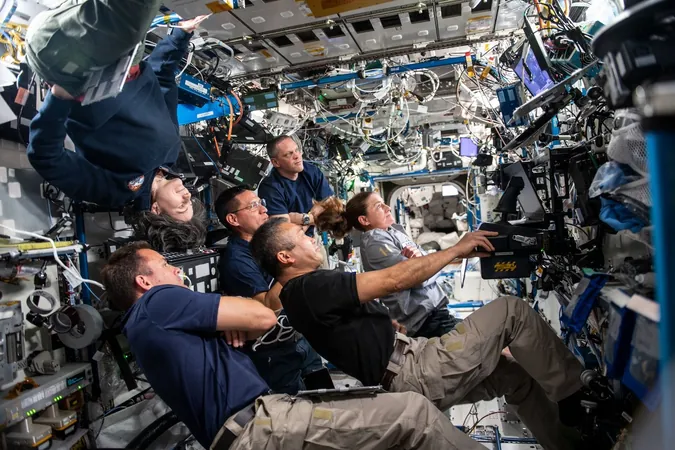
Houston, We Have a Cognitive Challenge: Astronauts Struggle with Mental Tasks in Space!
2024-11-20
Author: Sarah
Groundbreaking New Study
A groundbreaking new study reveals unsettling insights into the effects of space travel on astronauts' cognitive performance—information that could significantly influence our ambitions for long-term space exploration missions to the Moon and Mars.
NASA's Research Findings
Conducted by NASA's Behavioral Health and Performance Laboratory, this study monitored the cognitive function of 25 astronauts aboard the International Space Station (ISS). The results, published in the scientific journal Frontiers in Physiology, show that astronauts exhibited slower performance in key areas such as processing speed, working memory, and attention while living in microgravity. This could raise serious concerns about how the effects of space could hinder the success of future deep-space missions.
Testing Methodology
As part of the research, the crew members undertook a series of ten cognitive tests conducted on Earth before their ascent into space and twice again following their return (10 days and then 30 days post-landing). Their performance was also assessed during their six-month missions in space, both early on and toward the end. Researchers carefully measured response speed and accuracy across these varying conditions.
Key Findings
The findings indicated that while astronauts were slower to respond to tasks in space, their accuracy remained intact. Thankfully, no enduring cognitive impairments were observed upon their return to Earth. 'Living and working in space was not associated with widespread cognitive impairment that would be suggestive of significant brain damage,' stated Sheena Dev, the study's lead author.
Implications of Cognitive Slowdowns
However, the consequences of these cognitive slowdowns during space missions should not be overlooked. Risks associated with space—including exposure to radiation, the challenges of microgravity, and the stress of mission constraints—can wreak havoc on brain function. 'Even on Earth, factors like lack of sleep or high stress can briefly diminish one's ability to focus. Space amplifies those challenges considerably,' Dev said.
Physical Toll of Space Travel
Moreover, research into the physical toll of space travel has documented severe effects, such as loss of muscle mass and bone density, along with heart, eye, and spinal issues. In terms of cognitive health, limited studies have hinted that long-duration missions could alter cerebrospinal fluid dynamics, with changes lingering well after astronauts step back onto solid ground. Findings from a study in 2020 indicated that these alterations can persist for up to a year post-mission.
Challenges for Future Missions
As NASA gears up for its ambitious Artemis program, which aims to establish a sustainable human presence on the Moon before journeying to Mars, it becomes increasingly vital to address these cognitive and physical challenges. Experts warn that without further research and innovative strategies to combat the adverse effects of space travel, we could be jeopardizing the health and safety of future astronauts.
Conclusion
Are we prepared to tackle these psychological hurdles as we embark on humanity's quest to explore the cosmos? The stakes have never been higher, and as space agencies strive for progress, the race against time to protect our astronauts' health is on!



 Brasil (PT)
Brasil (PT)
 Canada (EN)
Canada (EN)
 Chile (ES)
Chile (ES)
 España (ES)
España (ES)
 France (FR)
France (FR)
 Hong Kong (EN)
Hong Kong (EN)
 Italia (IT)
Italia (IT)
 日本 (JA)
日本 (JA)
 Magyarország (HU)
Magyarország (HU)
 Norge (NO)
Norge (NO)
 Polska (PL)
Polska (PL)
 Schweiz (DE)
Schweiz (DE)
 Singapore (EN)
Singapore (EN)
 Sverige (SV)
Sverige (SV)
 Suomi (FI)
Suomi (FI)
 Türkiye (TR)
Türkiye (TR)